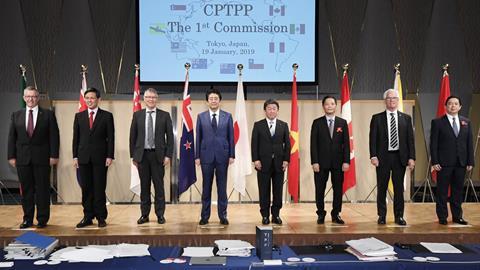A Lords committee report counsels caution in negotiating Global Britain’s international trade goals, as the government is facing a long list of legal hurdles that will need to be overcome
Last week was International Trade Week, created as part of the government’s effort to convert UK business from a Euro-centric to a global mindset. Trade policy minister Penny Mordaunt set the tone by announcing her enthusiasm for negotiating a comprehensive free trade agreement with the US. A deal would set global standards and increase bilateral trade by up to £15.3bn, she said.
Acknowledging that ‘we know the US has more to do to be ready for an FTA’, she said ‘when they are, we will be waiting for them’.
However another development last week suggests this may be optimistic. A lengthy report by a Lords committee on another hoped-for trade deal sets out a list of legal obstacles that need to be overcome along the road to Global Britain. They include conflicts in intellectual property and data protection law, and the need to move beyond the European ‘precautionary principle’ when approving innovations.
New frameworks will also be needed to encourage the mutual recognition of professional qualifications – a matter unlikely to be spelled out in the black letter of major free trade agreements.
The Lords International Agreements Committee was examining the negotiating positions set out by the UK government for accession to the Comprehensive and Progressive Agreement for Trans-Pacific Partnership (CPTPP), an 11-country successor to the Trans-Pacific Partnership, which was killed off by president Trump in 2017. Members range in geography and poltico-legal culture from Australia and Canada to Mexico, Japan and Vietnam, accounting for 13% of the world’s GDP. This would rise to 16% on the UK’s accession, equivalent to the EU but growing more strongly. Hence the UK’s interest in signing up, a prospect furthered by last month’s agreement of a trade deal with New Zealand.
However in its inquiry, the committee, chaired by Lord Goldsmith (Debevoise & Plimpton partner and former attorney general Peter Goldsmith QC) identifies several conflicts between the US-oriented provisions of the CPTPP and current UK law.
In IP law, for example, the committee reports that the Pacific agreement is ‘partly built on a US approach to regulation… Joining CPTPP may result in conflicts with the UK’s current regulatory regime, which will need to be addressed as part of the accession negotiations’.
For example the European Patent Convention, to which the UK belongs, stipulates that an invention cannot be recognised as new if it has been released to the public: the CPTPP allows a 12-month grace period in some circumstances. The committee cites warnings from witnesses that the UK could suffer ‘direct economic damage’ if it had to leave the European regime, including a ‘dramatic’ shrinking of the UK patent profession.
The report urges the government to explain how it will reconcile its obligations under the European convention and provisions in the CPTPP.
Likewise on data protection, the report states that a clause in the CPTPP may conflict with the UK’s ‘data adequacy’ status with the EU, already potentially threatened by the government’s decision to draw up a new data protection regime. Again, it calls for more information.
Another obvious conflict is between the European ‘precautionary approach’ to innovations such as genetic modification and the CPTPP’s ‘science-based’ approach. The committee calls on the government ‘to articulate how it will seek to manage these divergent regulatory approaches’.
Elsewhere, the committee finds that, while the CPTPP has useful provisions for professional services, it quotes the Law Society as finding that the aims of legal professionals ‘are unlikely to be realised’ directly by the agreement. The CPTPP merely states that each party ‘shall encourage its relevant bodies to establish dialogues’ on the topic. This ‘could give the UK a seat at the table in driving improvements in the liberalisation of trade in legal services’, the Society told the committee’s inquiry.
A parliamentary measure to guarantee the freedom of regulators to set standards for recognition of overseas qualifications, the Professional Qualifications Bill, is due before the Commons shortly.
However an overall note of caution from the committee is that the UK is applying to accede to an existing agreement and thus ‘the extent to which it needs to be accepted “as is” or can be changed is uncertain’. But in her speech last week, Mordaunt did not foresee any conflict. After all, she said, ‘free markets and democracy walk hand in hand’.





































No comments yet